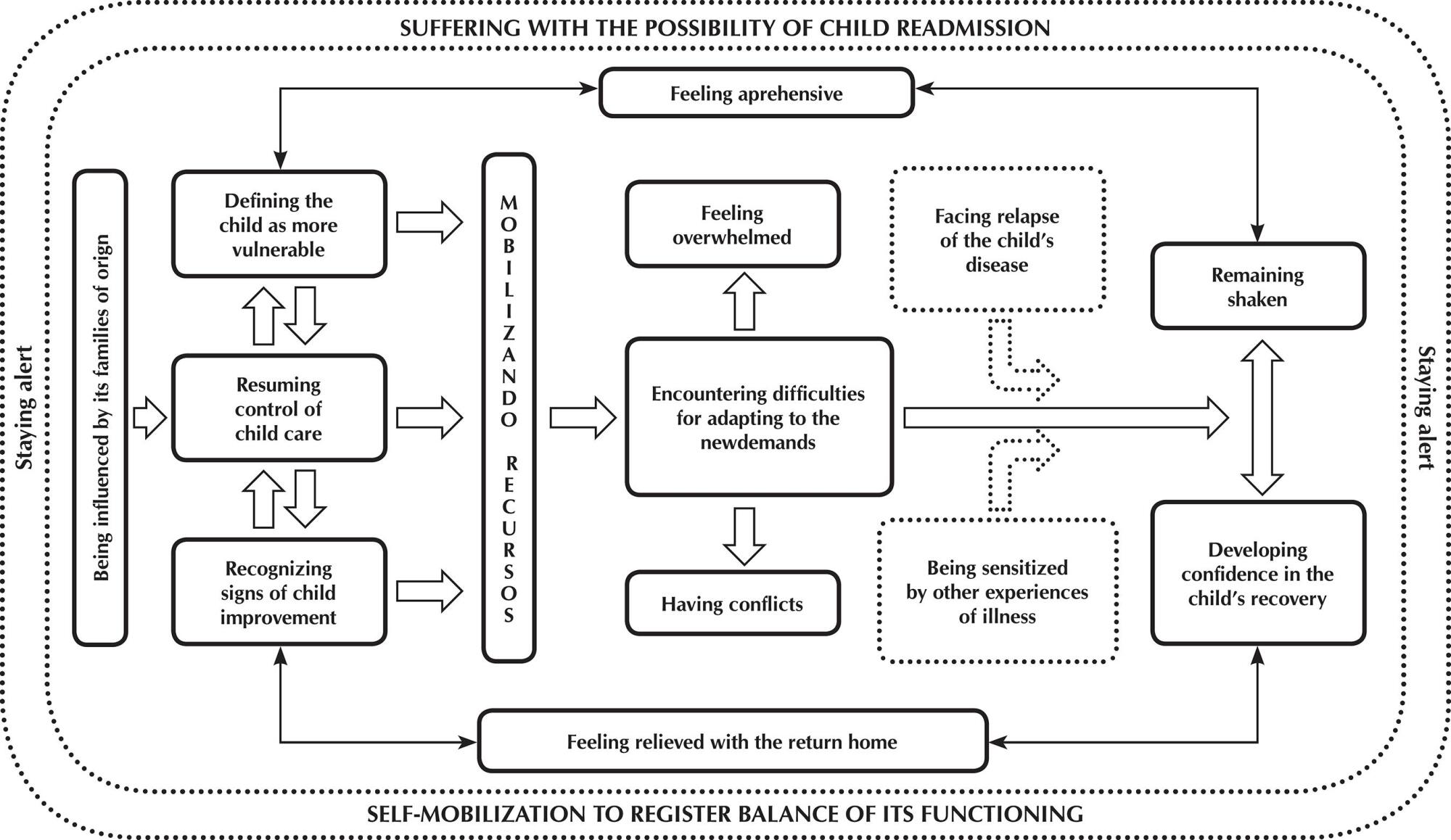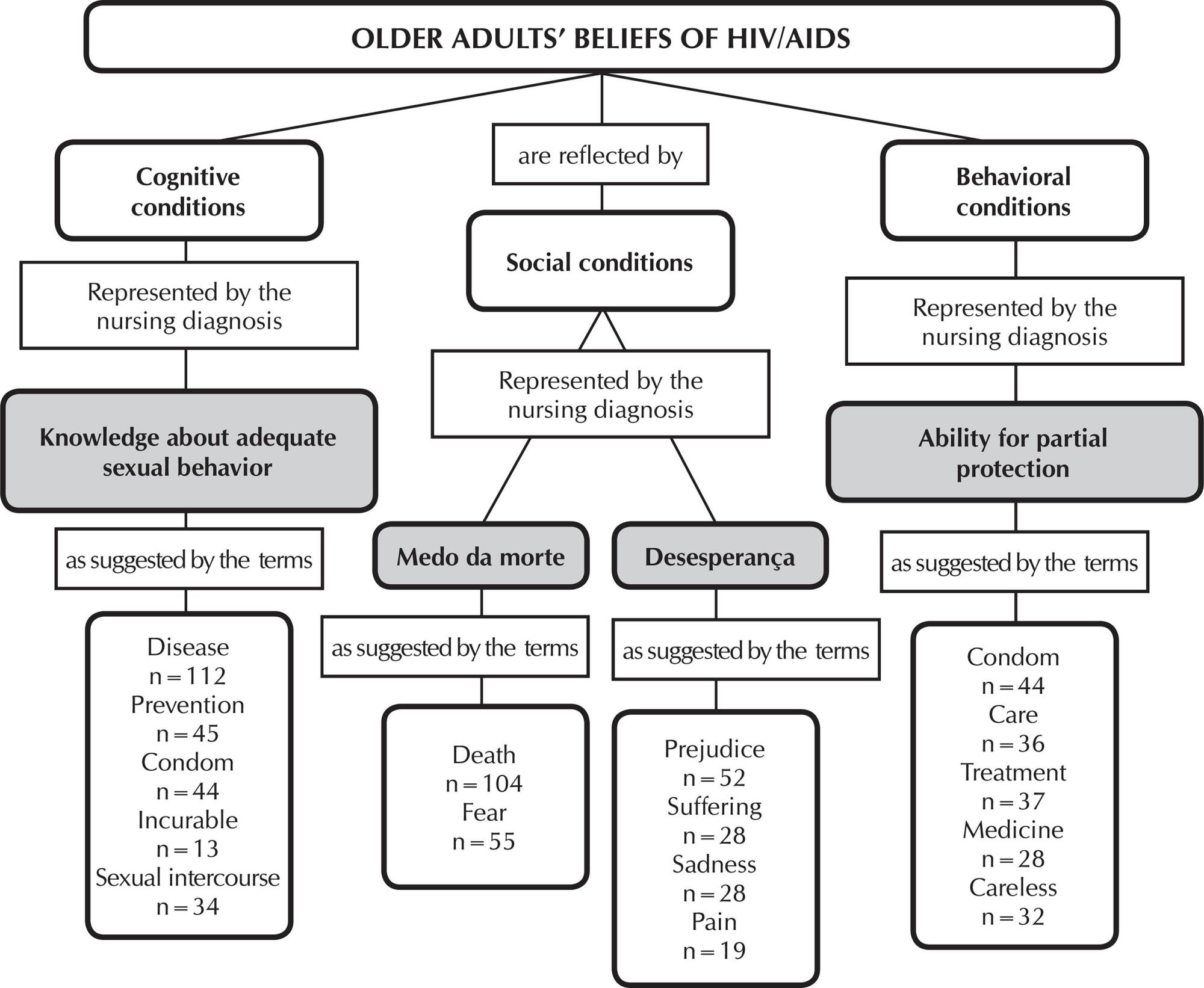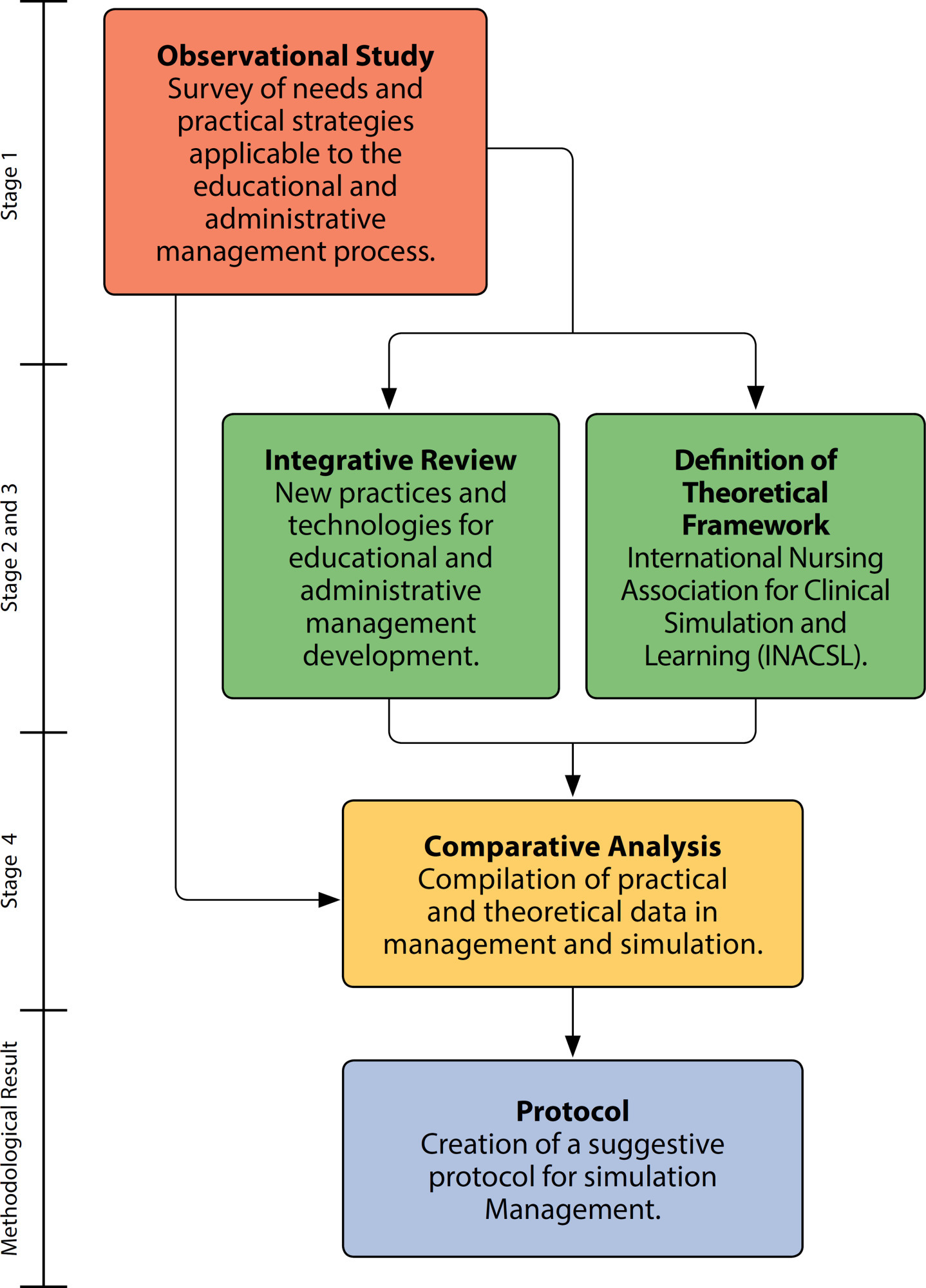-
01-01-2015
Social representations about religion and spirituality
Revista Brasileira de Enfermagem. 2015;68(4):609-616
Abstract
Social representations about religion and spirituality
Revista Brasileira de Enfermagem. 2015;68(4):609-616
DOI 10.1590/0034-7167.2015680406i
Views0See moreABSTRACT
Objective:
to identify the social representations about the concepts of spirituality and religion of of health teachers.
Method:
exploratory and descriptive study, based on a qualitative approach. 25 subjects participated in it. The following instruments were used to collect data: questionnaire to identify the profile; questionnaire of free association, whose inducing words were religion and spirituality, and an interview based on the scale FICA (Puchalski, 2006).
Results:
the representations about religion and spirituality, for professors, are forged around the faith in God and it gives them meaning and purpose to deal with the challenges of personal and professional living.
Conclusion:
there are still barriers that need to be overcome with a view to a comprehensive care. For this, it is essential to incorporate spirituality in the process in the curricula of health courses.

-
01-01-2015
Prevalence and factors associated with smoking among tobacco growers in southern Brazil
Revista Brasileira de Enfermagem. 2015;68(4):603-608
Abstract
Prevalence and factors associated with smoking among tobacco growers in southern Brazil
Revista Brasileira de Enfermagem. 2015;68(4):603-608
DOI 10.1590/0034-7167.2015680405i
Views0See moreABSTRACT
Objective:
identify the prevalence and factors associated with smoking in tobacco growers.
Method:
descriptive, cross-sectional research. Data collection occurred in 2012 through household survey and interviews, including application of a structured instrument and scale Fargeström.
Results:
there were 100 growers included, average age of 46,9 ± 10,8 years; 90(90%) married; 72(72%) white, average family composition 3,7±1,1 people; median number of children 3(1-3), and the average study time 6±2,5. The prevalence of smoking among tobacco growers was 17%, which had less education (p=0.010) and fewer people in the household (p=0.049).
Conclusion:
the prevalence of smoking among tobacco growers was higher than the national average, but the nicotine dependence was low, which can facilitate the smoking cessation process. Highlights the need to implement a program to control smoking among tobacco growers.
-
01-01-2015
The family living the child recovery process after hospital discharge
Revista Brasileira de Enfermagem. 2015;68(4):594-602
Abstract
The family living the child recovery process after hospital discharge
Revista Brasileira de Enfermagem. 2015;68(4):594-602
DOI 10.1590/0034-7167.2015680404i
Views1See moreABSTRACT
Objective:
to understand the meaning attributed by the family to its experience in the recovery process of a child affected by an acute disease after discharge, and to develop a theoretical model of this experience. Symbolic interactionism was adopted as a theoretical reference, and grounded theory was adopted as a methodological reference.
Method:
data were collected through interviews and participant observation with 11 families, totaling 15 interviews. A theoretical model consisting of two interactive phenomena was formulated from the analysis: Mobilizing to restore functional balance and Suffering from the possibility of a child’s readmission.
Results:
the family remains alert to identify early changes in the child’s health, in an attempt to avoid rehospitalization.
Conclusion:
the effects of the disease and hospitalization continue to manifest in family functioning, causing suffering even after the child’s discharge and recovery.

-
01-01-2015
Multiprofessional residency in health: a document analysis of political pedagogical projects
Revista Brasileira de Enfermagem. 2015;68(4):586-593
Abstract
Multiprofessional residency in health: a document analysis of political pedagogical projects
Revista Brasileira de Enfermagem. 2015;68(4):586-593
DOI 10.1590/0034-7167.2015680403i
Views0See moreABSTRACT
Objective:
To analyze MPRH political pedagogical projects (PPP) developed in the state of São Paulo and identify scenarios that are highly favorable to IPE.
Method:
This was a descriptive exploratory study conducted through document analysis.
Results:
The analysis revealed a heterogeneous scenario regarding the curricula, didactic and pedagogical organization, educational objectives, pedagogical matrices and evaluation systems employed. One of the programs was identified as providing a highly favorable setting for IPE.
Conclusion:
The analysis adequately evaluated IPE in educational settings and found a highly favorable scenario for it, identifying didactic, pedagogical, political and organizational MPRH elements.
-
01-01-2015
Beliefs of older adults about their vulnerability to HIV/Aids, for the construction of nursing diagnoses
Revista Brasileira de Enfermagem. 2015;68(4):579-585
Abstract
Beliefs of older adults about their vulnerability to HIV/Aids, for the construction of nursing diagnoses
Revista Brasileira de Enfermagem. 2015;68(4):579-585
DOI 10.1590/0034-7167.2015680402i
Views0See moreABSTRACT
Objective:
to know the beliefs of older adults about their vulnerability to HIV/Aids, and to identify nursing diagnoses.
Method:
a field research implemented in Family Health Units, in João Pessoa, Brazil. The sample included 250 older adults of both genders with data collected from April to July of 2011. A Test of Free Word Association was applied using the term HIV/Aids. A content analysis and cross-mapping of the most frequent terms with the International Classification for Nursing Practice, 2011 were performed.
Results:
202 terms were identified in terms, with an overall frequency of 1156. Of the 202 terms, 16 were more frequent and were used to construct the nursing diagnoses. The diagnoses identified were knowledge about appropriate sexual behavior, ability for partial protection, fear of death and hopelessness.
Conclusion:
understanding these beliefs drew from knowledge about factors related to, vulnerability to HIV/Aids aimed at planning health care actions for this population segment.

-
LETTER TO THE EDITOR01-01-2015
Considerations about the manuscript published
Revista Brasileira de Enfermagem. 2015;68(4):577-577
Abstract
LETTER TO THE EDITORConsiderations about the manuscript published
Revista Brasileira de Enfermagem. 2015;68(4):577-577
DOI 10.1590/0034-7167.20156804c
Views0Re: Chinese auriculotherapy to improve quality of life of nursing team To the Editor,[…]See more -
01-01-2015
A Pesquisa em Enfermagem e os novos rumos a partir do SENPE
Revista Brasileira de Enfermagem. 2015;68(4):571-572
Abstract
A Pesquisa em Enfermagem e os novos rumos a partir do SENPE
Revista Brasileira de Enfermagem. 2015;68(4):571-572
DOI 10.1590/0034-7167.2015680401i
Views0Após quase meio século do início da pesquisa em Enfermagem no Brasil, ainda há necessidade de investimentos para considerá-la consolidada. Os seminários nacionais que discutem a investigação nesta área demonstram esta afirmação ao longo de 17 eventos, por seus resultados e participação da categoria de pesquisadores e prestadores de serviço.O 18º Seminário Nacional de Pesquisa […]See more
-
ORIGINAL ARTICLE12-13-2019
Factors related to quilombola attendance to child follow-up appointments
Revista Brasileira de Enfermagem. 2019;72:9-16
Abstract
ORIGINAL ARTICLEFactors related to quilombola attendance to child follow-up appointments
Revista Brasileira de Enfermagem. 2019;72:9-16
DOI 10.1590/0034-7167-2017-0605
Views0See moreABSTRACT
Objective:
To understand factors interfering with the attendance of quilombola children to growth and development follow-up appointments.
Method:
It is a qualitative research based on Symbolic interactionism, during which 14 mothers of children bellow 1 year-old were interviewed, who attended to the Family Health Unit at Ilha de Maré, Bahia, Brazil.
Results:
Appointment attendance is affected by factors intrinsic to mothers (meaning of child health follow-up; association between appointments and children falling ill; personal issues) and extrinsic factors, related to the service (availability, long waiting time for appointments and its quality).
Final considerations:
An administration prioritizing the service’s organization is required, which can prioritize attendances and the reduction of waiting time, specially given the personal issues that compromise going to the unit.
-
ORIGINAL ARTICLE07-18-2022
Cultural adaptation and content validity evidence of the Nutritional Literacy Scale Brazilian version
Revista Brasileira de Enfermagem. 2022;75(6):e20210657
Abstract
ORIGINAL ARTICLECultural adaptation and content validity evidence of the Nutritional Literacy Scale Brazilian version
Revista Brasileira de Enfermagem. 2022;75(6):e20210657
DOI 10.1590/0034-7167-2021-0657
Views0See moreABSTRACT
Objective:
To investigate the evidence of content validity and reliability of the Brazilian version of the Nutritional Literacy Scale (NLS) after the cultural adaptation process.
Methods:
Psychometric study of 1,197 users of the National Health Service (Brazilian SUS). The NLS was culturally adapted to Brazilian Portuguese and six items of the original scale were modified to improve its understanding, giving rise to the Brazilian version of the scale named NLS-BR. The analysis of evidence of content validity of the NLS-BR was performed using the Item Response Theory (IRT).
Results:
The final version of the NLS-BR had 23 items and proved to be adequate to assess nutritional literacy in adults assisted by the Brazilian SUS.
Final considerations:
The NLS-BR proved to be of adequate understanding and demonstrated evidence of content validity and reliability for users of the Brazilian SUS.

-
ORIGINAL ARTICLE12-13-2019
Nurses’ experiences in the care of high-risk newborns: a phenomenological study
Revista Brasileira de Enfermagem. 2019;72:111-117
Abstract
ORIGINAL ARTICLENurses’ experiences in the care of high-risk newborns: a phenomenological study
Revista Brasileira de Enfermagem. 2019;72:111-117
DOI 10.1590/0034-7167-2018-0221
Views0See moreABSTRACT
Objective:
To describe nurses’ experience in the care of high-risk newborns.
Method:
This is a descriptive study with a qualitative approach, based on Merleau-Ponty’s phenomenology and performed at the Fernando Magalhães Maternity Hospital in the state of Rio de Janeiro, through interviews with 30 nurses who work in neonatal care, according to the phenomenological thinking of Maurice Merleau- Ponty.
Results:
Three categories emerged: “experienced body of the nurse practitioner on the high-risk newborn”; “experienced world of the nurse practitioner on the high-risk newborn”; and “time spent by the nurse practitioner with the high-risk newborn”.
Final considerations:
The study allowed us to describe, through the participants’ speeches, that the care of the high-risk newborn is broad, that is, objective, subjective and carried out with advanced technologies, their experiences and scientific improvement are composed of shared practice and theory with the family, professionals and beginners in the neonatal universe, favoring a differentiated and humanized care.
-
ORIGINAL ARTICLE08-16-2021
Management in clinical simulation: a proposal for best practices and process optimization
Revista Brasileira de Enfermagem. 2021;74:e20200515
Abstract
ORIGINAL ARTICLEManagement in clinical simulation: a proposal for best practices and process optimization
Revista Brasileira de Enfermagem. 2021;74:e20200515
DOI 10.1590/0034-7167-2020-0515
Views0See moreABSTRACT
Objectives:
to develop a best practices document with facilitating components and processes for simulation management.
Methods:
the methodological research was conducted between April and October 2017, using four approaches: observational research, conducted in an international simulation institution; Definition of theoretical framework, from the International Nursing Association for Clinical Simulation and Learning; integrative literature review, in international databases; and comparative analysis. It used Bardin’s analysis for the categorization of the information.
Results:
creation of a document with good practices in simulation regarding management and practice in simulation and management of resources and data, highlighting the use of technology and the training of professionals as the most important allies for overcoming the main limitations found.
Final Considerations:
the product of this study is a compilation of strategies for simulation management as a tool to enhance the application of the method with greater effectiveness.

-
EXPERIENCE REPORT02-25-2022
Production and use of educational technologies in nursing post-graduation
Revista Brasileira de Enfermagem. 2022;75(5):e20210510
Abstract
EXPERIENCE REPORTProduction and use of educational technologies in nursing post-graduation
Revista Brasileira de Enfermagem. 2022;75(5):e20210510
DOI 10.1590/0034-7167-2021-0510
Views0See moreABSTRACT
Objective:
To report, under the light of Gardner’s Theory of Multiple Intelligences, the experience of students with advanced educational practices, involving the production and use of technologies in the postgraduation nursing course of the Universidade Federal de Pernambuco.
Methods:
Experience report of students from the post-graduation nursing program from the Universidade Federal de Pernambuco, about the production of knowledge using educational technology and the application of active methodologies in the teaching-learning process for face-to-face and distance teaching.
Results:
The post-graduate students participated in the educational process in a creative way, both during in-person and distance teaching. They created: domino games, educational videos, parodies, conceptual maps, virtual role-playing, an interactive quiz, among others.
Final considerations:
The experience of the students with the advanced educational practices, including the production and use of technologies in nursing post-graduation showed that the teaching-learning process can be innovative and planned to go beyond traditional methods.
-
ORIGINAL ARTICLE09-01-2021
Clinical Decision-Making in Nursing Scale (CDMNS-PT©) in nursing students: translation and validation
Revista Brasileira de Enfermagem. 2021;74:e20210032
Abstract
ORIGINAL ARTICLEClinical Decision-Making in Nursing Scale (CDMNS-PT©) in nursing students: translation and validation
Revista Brasileira de Enfermagem. 2021;74:e20210032
DOI 10.1590/0034-7167-2021-0032
Views0See moreABSTRACT
Objectives:
to validate, for the Portuguese population, the Clinical Decision-Making Nursing Scale© (CDMNS©).
Methods:
this methodological study involved 496 nursing students who filled in a questionnaire created using sociodemographic and academic data, and the scale to evaluate the making of decisions in nursing.
Results:
the confirmatory factorial analysis showed that the adjustment of the factorial structure has good quality, being made up by three factors (X2/gl = 2.056; GFI = 0.927; CFI = 0.917; RMSEA = 0.046; RMR = 0.039; SRMR = 0.050). For the scale to be reliable, it had to include only the reliability of the scale required it to be constituted by 23 items, with correlation values that varied from 0.184 and 0.610, and a global Cronbach’s Alpha of 0.851, which showed its good reliability.
Conclusions:
the CDMNS-PT© is valid and reliable, showing a high potential to be used in clinical practice and investigation.

-
ORIGINAL ARTICLE08-08-2022
Health literacy and adherence to the pharmacological treatment by people with arterial hypertension
Revista Brasileira de Enfermagem. 2022;75(6):e20220008
Abstract
ORIGINAL ARTICLEHealth literacy and adherence to the pharmacological treatment by people with arterial hypertension
Revista Brasileira de Enfermagem. 2022;75(6):e20220008
DOI 10.1590/0034-7167-2022-0008
Views0See moreABSTRACT
Objective:
To analyze the association between health literacy and the adherence to the pharmacological treatment of Brazilians with arterial hypertension.
Methods:
Cross-sectional study with 234 participants who responded an on-line sociodemographic and clinical characterization questionnaire, in addition to evaluation of health literacy and of the adherence to their pharmacological treatment. Data were analyzed using descriptive statistics and difference and correlation tests.
Results:
People with post-graduation, who were actively working and did not smoke, had better health literacy results. Elders and those who were retired or lived on government subsidies adhered better to the medication treatment. There was a correlation between the numerical dimension (rs=0.189; p=0.004) and the global health literacy result (r2=0.170; p=0.009) with the adherence.
Conclusions:
A better numerical and global understanding of health literacy was associated with better adherence to arterial hypertension medication treatment.
-
REVIEW04-22-2020
Health advocacy and primary health care: evidence for nursing
Revista Brasileira de Enfermagem. 2020;73(3):e20180987
Abstract
REVIEWHealth advocacy and primary health care: evidence for nursing
Revista Brasileira de Enfermagem. 2020;73(3):e20180987
DOI 10.1590/0034-7167-2018-0987
Views0See moreABSTRACT
Objectives:
to analyze nursing actions involving health advocacy in the context of primary health care and the consolidation of this right to health.
Methods:
this is an integrative literature review with content analysis of the results on health advocacy and its relationship with nursing in the context of primary health care.
Results:
the content analysis of the seven selected studies resulted in two thematic categories: “Right to health – a complex and progressive consolidation movement in Brazil” and “Advocacy in health and nursing”.
Conclusions:
despite the difficulties in defining the concept of health advocacy, nurses, in their practice, act with innovative alternatives to daily conflicts, exercising the users’ right to health in their relationships with health team members and the community.

Search
Search in:
Nuvem de Tags
Adolescente (85) Atenção Primária à Saúde (239) COVID-19 (91) Criança (91) Cuidados de Enfermagem (269) Educação em Enfermagem (151) Educação em Saúde (139) Enfermagem (930) Enfermagem Pediátrica (86) Estudantes de Enfermagem (77) Estudos de Validação (131) Família (87) Idoso (208) Promoção da Saúde (99) Qualidade de Vida (104) Saúde do Trabalhador (86) Saúde Mental (145) Saúde Pública (82) Segurança do Paciente (150) Tecnologia Educacional (100)



